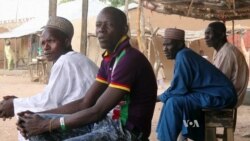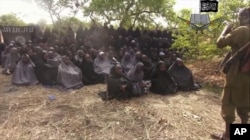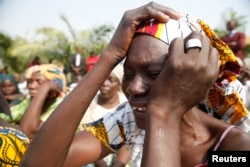It has been nearly two years since Boko Haram militants stormed the northeastern Nigerian town of Chibok and abducted more than 200 schoolgirls. Outside of propaganda videos created by the Islamist militant group, none has been seen since. In Nigeria’s remote northeast, the families of the missing girls say they are suffering because of their daughters’ absence.
The fathers sit in the scant shade at a marketplace in the town of Mbalala, waiting for their daughters to come home. They are the parents of four of the 219 girls abducted by Boko Haram militants from a school in the nearby community of Chibok nearly two years ago.
The kidnapping is Boko Haram’s most infamous crime. It attracted global condemnation and offers of help finding the girls from Nigeria’s allies.
Nigeria’s military and political leaders continue to pledge that they will rescue the students.
For the parents of the missing girls, nothing has been the same since the kidnapping.
Whenever he thinks of his missing daughter, Yawale Dunya says he feels feverish and starts shaking.
The government secondary school where the kidnapping happened is now a pile of rubble. Boko Haram burned down the girls dormitory after the kidnapping. The school was later demolished so it could be rebuilt. That has yet to happen, leaving Chibok and the towns around it without a school.
The lack of classrooms is just one of the town’s troubles. Boko Haram continues to menace the area. Militants briefly overran Chibok in 2014. In January of this year, suicide bombers killed at least 10 people in the town’s marketplace.
It has taken a toll on the people of Chibok, particularly the families of the missing girls. Yakubu Nkeki, head of an association of parents of the abducted schoolgirls, says 18 mothers and fathers have died since the mass kidnapping.
“This kind of incident is bring a lot of sickness. You are not in peace of mind, you can’t have time properly for your feeding. You’re living in fear, thinking of your young one in the hand of captors. You know, anything might take you and you lose your life,” said Nkeki.
In Mbalala, the families of the missing students seek solace in each others’ company.
When he is together with his friends and co-workers, Joseph Sanda says he is able to distract himself from thinking about his missing daughter. But when he is alone, she is all he can think about.








